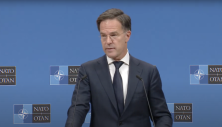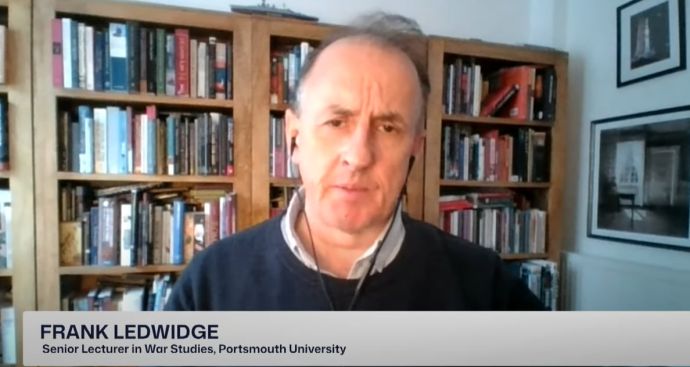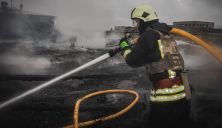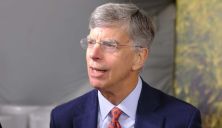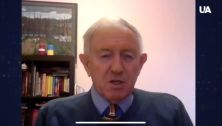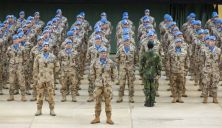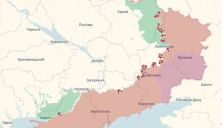Burns was a vocal and helpful ally of Ukraine – what about Ratcliffe? The kremlin mouthpiece Maria Zakharova and her ‘uncontrolled escalation’ if international peacekeepers are deployed in Ukraine. Recent ruzzian oil refineries ablaze – does the kremlin care much? Ukrainian Army – if you were in charge what would you do?
— As CIA director, I know William Burns was a vocal, very public, and helpful ally of Ukraine. As CIA director, what about Ratcliffe? Do you know anything? Any comments on that?
— Well, he has just passed his Senate confirmation, although not with a unanimous vote. He is, as I understand it, something of a Washington player—started out as a lawyer and politician, right? And now, I think to the extent that there are serious complaints against him—which clearly have not been significant enough to halt his confirmation—he’s got very close connections with a lot of tech companies, particularly AI operators, and some are concerned about that. But look, I have no doubt that he will act in his country’s interests. The CIA is a massive bureaucracy.
To my mind, the more important appointment is really Tulsi Gabbard, for whom I have a very great deal of regard. Being a veteran herself, she’s a really hard-spoken advocate for U.S. interests. And whatever country you’re in, it’s the job of an intelligence commander or leader to act in your country’s interests.
As to their effect on Ukraine, I can’t see it being significant either way.
— Well, yeah, AI tech companies are connected to him, that’s for sure, because Mr. RLI mentioned that the United States should be using artificial intelligence more. What—against whom?
— Well, look at their pacing threat, which is the People’s Republic of China. They have declared themselves to be taking military AI development as a priority. Any dominance in that space would existentially affect the United States. So absolutely, the U.S. has to gain dominance in AI—among many other domains. I can’t argue with that fact.
— Let’s smoothly slide to Russia, shall we? The Kremlin mouthpiece Maria Zakharova recently said that international peacekeepers in Ukraine will lead to—I quote her—”uncontrolled escalation.” Whatever that means. Like, now—is it controlled escalation?
What are your thoughts on the matter? The idea of international peacekeepers in general, and Russian red lines and threats of uncontrolled escalation if that happens in particular?
— We all know Ms. Zakharova and her periodic, sometimes occasional, lack of self-control.
Concerning the peacekeepers—look, people have to understand, there will be no NATO peacekeepers in Ukraine, for two reasons. First, they won’t be accepted in any peace deal. Secondly, even if they were, NATO could deploy between 20,000 and 30,000 at any one time. Right? And for a frontier of a thousand kilometers, that won’t work.
NATO is very weak in actual strength. On paper, of course, it has millions of people under command. But in reality, they’re a bit of a paper tiger.
— All right. Well, recent Russian oil refineries were set ablaze. Do you think the Kremlin feels anything about that? I mean—economically, politically, militarily?
— First of all, if I can just cut back for ten seconds on the NATO thing—what I mean is, NATO without the U.S. is a paper tiger.
But returning to the refineries, I want to put a couple of things in context. These were wars I was personally involved in and took an interest in.
In the war against Serbia, we had 38,000 air strike sorties against Serbian targets over about three months. That essentially did the job, although it didn’t do much damage to the Serbian armed forces.
In Iraq, in 1991, which is a more accurate analogy—since Iraq is quite big, though still much smaller than Russia—it was 103,000 jet bomber sorties.
Now, a few drones hitting the occasional oil refinery or arms dump? I’m afraid that will not make any significant dent.
If you want to break up a large country’s military and industrial capability, you need tens of thousands of missions and strike points to do that. It’s called “strike density” in military terminology, and Ukraine simply doesn’t have that at the moment—whatever we do.
— All right. So, the Ukrainian Army—if you were in charge, what would you change first as the chief commander of the Ukrainian Army?
— Okay, well, it’s very easy—and lots of people do—this armchair generalship. I don’t think I, or they, should do that.
But one observation before a suggestion—fire and expel from the country every Western general who purports to give advice. None of these people have fought a war anything like the way Ukraine is fighting. And I fought in the same wars as them—I can assure you that’s true. The wars we fought were brush wars, and they all failed in any event.
Fire them. Dismiss them. Don’t listen to a word they say.
There are Ukrainian generals—I have no doubt—who are perfectly capable of handling the kind of flexible defense the country needs. Were they to be promoted—because certainly, they’re not in place now—I would urge their chiefs of staff to read some military history. Look at the campaigns of British General Slim in World War II, Russian General Zhukov, or German General H. von Manstein—all of whom were masters of defensive warfare.
Since we don’t have that academic luxury, though, if I were in charge, I would say this:
Find young officers—battalion commanders, brigade commanders—who have succeeded, who are respected by their men, and you and I know they exist. Promote them. Promote them for success, and fire failures from top to bottom.
As for strategy, I can’t say. But I’m sure many Ukrainians, including Ukrainian soldiers, might argue that this constant pattern of salients developing—L-shaped positions, then abandoning soldiers in them—such as in Velyka Novosilka, Avdiivka, Bakhmut, or half a dozen others—is no way forward.
What it results in is dead Ukrainian soldiers for no palpable gain. That, to me, looks like poor planning and disastrous operational execution.
— Last question—Donald Trump. Does he have the capability to talk the language he’s using with the Russian dictator? I mean—he says it’s this way or the hard way. Can he really do that?
— Well, you know as well as I do the answer to that.
No one—not even the people closest to him—knows for sure.
I’ll just make this observation—certainly, he can speak to Putin in his own language, for better or worse. Whether he should involve Ukraine, whether he will involve Ukraine—certainly, he won’t involve the Europeans in this, I think we’ve seen that. That’s another question.
But look—I’m fairly confident that if anyone can do it, he can.
There are some doubts being raised, though, and you’re probably aware of this—about General Kellogg and his background in this. But look, he’s the person in place. We’ll see how that plays out over the next three to four months.
Read also: Preparing for Russia’s Collapse: Ben Hodges on War Future
